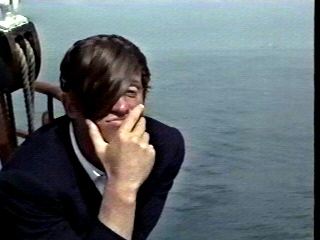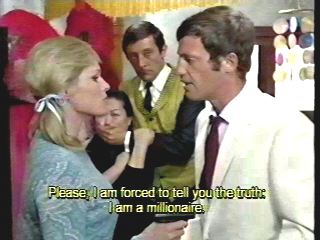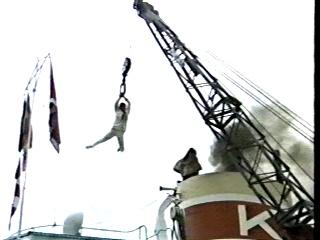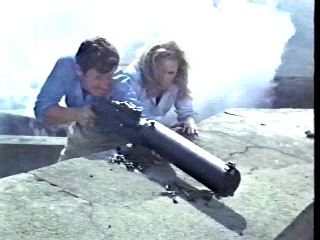
|
|
|
|
|
|
|
|
|
|
|
|
|
(a.k.a. Les Tribulations D'Un Chinois En Chine) (1965) Director: Philippe De Broca
Way back when I reviewed Don't Die Too Hard!, I came to the conclusion that France had finally managed to evolve its cinema, from a state of being that previously had a focus on pretentiousness and utter boredom, to presently a higher level that not only acknowledges an audience but attempts to please it. (In other words, real movies.) If you take the time to study French cinema, you'll see that it took years for it to make that vital evolution. The first steps towards this ideal state happened a few decades ago, using the same technique to explain how a kick-ass action movie like Strange Shadows In An Empty Room came out of Canada: co-productions with Italians. Just a few minutes into watching Up To His Ears, it's obvious that Italians were lurking around. There's also no doubt all those years back that when the various producers and investors of the movie had their first production meeting, the Italian members were quick to use the technique they typically used when dealing with a country that had a questionable cinema: Roll up their sleeves and flex their giant muscles, resulting in the members of the production team coming from the other country becoming agog and completely cowed by such a macho spectacle. Then before the foreigners could shake out of their stunned state, the Italians would use the opportunity to use their real movie-minded brains to turn the negotiations favorable to themselves, in order to ensure the movie would be made as a real movie. Though as it happened in this particular France-Italy
co-production, a number of the elements the Italians got placed in Up
To His Ears no Curiously, though, the setting of the story is still China (maybe the Italians didn't think France was "real" enough for a worldwide audience.) The events of Up To His Ears concern Arthur Lempereur (Belmondo), one of the three richest citizens of France. But when the film opens, we see he is extremely unhappy despite all his wealth and that presently he's on a private cruise of the Orient with his fiancé Alice and her family. The opening scene shows him engaged in his ninth suicide attempt... of the week. Only his tutor and friend Mr. Goh (Valéry Inkijinoff, Mistress Of The World) knows what's wrong: "He lacks adversity, which is the very spice of life." Yet when his lawyer arrives with news that Arthur's entire fortune was lost in the stock market (which results in Alice's mother cancelling the engagement), this particular adversity makes Arthur feel worse. Goh manages to interrupt Arthur's subsequent suicide attempt with a proposal: If he is determined to die no matter what, why not do it in a way that will end up doing some good? That way happens to be by signing a 30 day insurance policy worth $2 million, to be split between Goh and Alice upon Arthur's death. There is a suicide clause, but no worries - Goh promises to quickly and painlessly knock Arthur off sometime during those 30 days. "Get drunk and have fun!" Goh advises just before suddenly disappearing, leaving a confused Arthur solo on the busy streets of Hong Kong. Of course this predicament, even for someone as suicidal as Arthur, would never sit still with anyone - could you be absolutely sure death would be quick and painless? It's no wonder that Arthur is subsequently a nervous wreck, especially when he finds himself constantly running away from two men in trenchcoats pursuing him. The situation gets more complicated when Arthur ducks into a strip club to hide, and lays eyes on the luscious Alexandrine Pinardel (Andress) performing her act. He is immediately smitten, and after managing to wangle a dinner invitation from her, feels filled with confidence and hope for the first time. Seeing things now in a new light, he decides to cancel the whole idea of having himself killed. But when he subsequently tries to track down Mr. Goh, Arthur not only learns that he's left town, but has given the assignment to some unknown individual! So taking his trusty butler Leon (Jean Rochefort, The Closet) with him, Arthur embarks on a desperate journey to locate Goh before it's too late. What follows is a series of madcap events as Arthur
struggles to set everything straight, Though each of these "stories" of sorts are entertaining, the idea of putting them together as different parts of one story doesn't quite work. Though I had a lot of fun watching the movie, at the same time I felt a sense of dissatisfaction with what was going on behind all the silliness and action. A typical narrative slowly builds up to a climax, even if it undergoes some major evolution during the way. With the slow but gradual build in the story, our minds are not overtaxed enough to keep up. Not only that, but we are able to simultaneously keep building our anticipation for the climax, so we can experience a maximum feeling of satisfaction when it does happen. But in the case of Up To His Ears, because of its multiple "stories", several times the movie builds itself up to a great height much too early. Then when each "story" ends, the movie immediately afterwards plunges down to great depths to a level much not higher than where the movie originally started. Our minds, not anticipating such early payoffs of sorts, are rudely jolted, and we are pushed immediately to start at a much lower level than we were seconds before. The rides along the way is fun; it's just that the destinations are kind of undesirable. It's pretty obvious what the next problem is with this unconventional narrative. The movie is so determined to deliver action and laughs by placing its hero in immediate conflicts, each taking a considerable amount of time to resolve, that there really isn't much of a story. A good way to describe it would be if The Fugitive had been made without any of the quiet scenes of its hero slowly piecing together a way out with research and detective work. The limited amount of time Up To His Ears devotes to actually telling a story unavoidably adds to that feeling of dissatisfaction that I was talking about. Take Arthur's relationships with the two women he's romantically involved with, first with his fiancé. It's really hard to call it a relationship at all, at least from our viewpoint, because at not one time do we see them interacting as a couple. In fact, I can't recall them actually talking directly to each other, not just because Alice's pompous and controlling parents do all the talking and decisions, but that Alice is given hardly anything to say. Maybe this was done to try and not make Arthur seem like a total cad for dumping her in favor of Alexandrine, but it doesn't work, because though Alice is not sketched out much, nothing that we do see rubs us the wrong way. Even if the movie had instead gone for that tired cliché of "hero's original fiancé is a shrill bitch", it not only would have made Arthur's new pursuit more palatable, it would also have given the story something of substance. The character of Alexandrine also falls victim to the
movie's decision to give little time to thicken out the plot. Her first
appearance actually While Andress may be the most recognizable performer in the movie (at least to most North Americans), the one performer that will stick in your mind long afterwards is Belmondo. Before seeing Up To His Ears, I had only seen him in The Professional, where he did well playing a hardened and weary hitman seeking vengeance. Recalling that tough performance, it was not only surprising to see him involved in a number of humorous scenes, but that he did all this comedy pretty well, showing a great deal of comic talent. And not just in one or two particular areas of comedy, but a wide range. Given a character that basically a coward, Belmondo gives off exaggerated (though carefully not too overdone) body reactions to anything that spooks his character to hilarious effect, such as when Arthur is surprised by exploding firecrackers. The various facial expressions Belmondo adds to such scenes, or even scenes where little to nothing is going on, are funny as well, never attaching any pointless dialogue to pay attention to them. Whatever kind of comedy Belmondo finds himself facing, tackles it with ease. Even if its plain simple slapstick, or something that has already been done to death (like dressing in drag as a disguise, then forced to go onstage in that outfit), Belmondo manages at the very least to give it a spark that makes even the weaker bits lively. So even while there may be a next-to-nonexistent story in Up To His Ears - and the limited plot may crawl at a pace next-to-standstill, Belmondo helps to keep the energy and interest up with his comic contributions... for starters. You may not know it, but Belmondo made a name for himself in Europe partly because he did all of his own stunts. And in this movie, the stunts come fast and furious as his character Arthur is forced to constantly get out of danger. During the course of the movie, Belmondo is seen grabbing the hook of a crane and being lifted many feet in the air, tumbling down a flight of stairs, tumbling down the side of a snowy mountain, gets set on fire, and is smashed against buildings and stone walls as he holds onto an anchor rope trailing down from a runaway hot air balloon... for starters. The stunts are constructed to be spectacular by themselves, but with Belmondo actually performing them, they have an extra edge to them. Of course, with the actual actor performing the stunts, the scenes have a degree of authenticity to them that wouldn't come from a stunt man. But Belmondo also retains the often hysterical behavior of Arthur while in these scenes, making the action funny as well as exciting, sometimes brilliantly so. Buster Keaton clearly had a great influence on this film, and some scenes, like the jaw-dropping visual gag during the rope bridge sequence, would seem perfectly at home in the Master's films. So while Up To His Ears may have
non-existent characters and story, it manages
Check for availability on Amazon See also: Don't Die Too Hard, I Wonder Who's Killing Her Now, Watch Out We're Mad |
 doubt
pleased the French camp. True, the French did have to accept the
inclusion of a worldwide sex symbol not native to their country (Ursula
Andress), to boost the box office potential in all world territories.
As well, they had to put (gasp!) action and (blasphemy!) comedy in the
movie, the news of which no doubt had New Wave directors like Goddard
foaming at the mouth. (It's a dream of mine, by the way, to force that
loudmouth Goddard to watch a Jerry Bruckheimer film festival Clockwork
Orange-style.) But amazingly, the French still managed to
retain a good amount of control over the movie. For one thing, they
managed to cast one of their own actors, Jean-Paul Belmondo (Casino
Royale, The Professional), to play the lead...
though one has to keep in mind that in the previous year, Belmondo was
in the (French-Italian, of course) James Bond spoof That Man
From Rio, which was a world-wide hit. More of a triumph for the
French camp was that they not only managed to give the movie a French
director (Philippe De Broca, King Of Hearts), but that
their French screenwriter was adapting a French piece of literature.
And that piece of literature happened to be written by Jules Verne, his
obscure novel The Tribulations Of A Chinaman In China. Of
course, the character in this cinematic adaptation is transformed into
a Frenchman, despite the original French title remaining; you got to
admire how the French are always quick to pick up where one of their
brethren stumbled in making a contribution to that jewel called French
culture.
doubt
pleased the French camp. True, the French did have to accept the
inclusion of a worldwide sex symbol not native to their country (Ursula
Andress), to boost the box office potential in all world territories.
As well, they had to put (gasp!) action and (blasphemy!) comedy in the
movie, the news of which no doubt had New Wave directors like Goddard
foaming at the mouth. (It's a dream of mine, by the way, to force that
loudmouth Goddard to watch a Jerry Bruckheimer film festival Clockwork
Orange-style.) But amazingly, the French still managed to
retain a good amount of control over the movie. For one thing, they
managed to cast one of their own actors, Jean-Paul Belmondo (Casino
Royale, The Professional), to play the lead...
though one has to keep in mind that in the previous year, Belmondo was
in the (French-Italian, of course) James Bond spoof That Man
From Rio, which was a world-wide hit. More of a triumph for the
French camp was that they not only managed to give the movie a French
director (Philippe De Broca, King Of Hearts), but that
their French screenwriter was adapting a French piece of literature.
And that piece of literature happened to be written by Jules Verne, his
obscure novel The Tribulations Of A Chinaman In China. Of
course, the character in this cinematic adaptation is transformed into
a Frenchman, despite the original French title remaining; you got to
admire how the French are always quick to pick up where one of their
brethren stumbled in making a contribution to that jewel called French
culture.  little knowing that down the road there will
be further complications to what is already a life-or-death situation.
Anything can and does happen; it's incredible not just how many
outlandish situations Up To His Ears creates for its
protagonist, but also the sheer variety of these situations. One thing
you simply can't say about this movie is that it's dull. Not just for
the variety of the various struggles Arthur gets in, but that all these
situations Arthur finds himself in (comic or action... or even both)
for the most part manage to deliver an acceptable amount of
entertainment at the very least. These results of the movie's strenuous
attempts to please the audience alone do make Up To His Ears an
amusing adventure that's worth a detour, as the Michelin travel guide
would put it. However, though it has plenty of ideas to give the
audience laughs and thrills, they are put together that results in a
narrative that's not so satisfying. Though all the remaining events in
the movie center around Arthur's desperate struggle to stay alive, it
comes across more as a series of vignettes instead of one
evolving story. Circumstances force Arthur to travel to and across
Tibet for a long period, though he returns to Hong Kong with his
situation essentially unchanged. Then he finds himself pursued by a new
adversary for a good length of time. When he ultimately manages to
resolve that problem, he immediately finds himself pursued by a new
threat for the remainder of the movie.
little knowing that down the road there will
be further complications to what is already a life-or-death situation.
Anything can and does happen; it's incredible not just how many
outlandish situations Up To His Ears creates for its
protagonist, but also the sheer variety of these situations. One thing
you simply can't say about this movie is that it's dull. Not just for
the variety of the various struggles Arthur gets in, but that all these
situations Arthur finds himself in (comic or action... or even both)
for the most part manage to deliver an acceptable amount of
entertainment at the very least. These results of the movie's strenuous
attempts to please the audience alone do make Up To His Ears an
amusing adventure that's worth a detour, as the Michelin travel guide
would put it. However, though it has plenty of ideas to give the
audience laughs and thrills, they are put together that results in a
narrative that's not so satisfying. Though all the remaining events in
the movie center around Arthur's desperate struggle to stay alive, it
comes across more as a series of vignettes instead of one
evolving story. Circumstances force Arthur to travel to and across
Tibet for a long period, though he returns to Hong Kong with his
situation essentially unchanged. Then he finds himself pursued by a new
adversary for a good length of time. When he ultimately manages to
resolve that problem, he immediately finds himself pursued by a new
threat for the remainder of the movie. isn't very long,
with maybe ten minutes at the most given to introduce her to the
audience, next to Arthur, then the remaining few minutes with her and
Arthur having dinner. With this brief introduction, and the fact her
character has given a major turnaround to Arthur's way of thinking, it
seems logical to think that she will be playing a major role in what's
to come, given that Arthur romantic feelings are now directed towards
her. Instead, the movie at this point chooses to completely forget
about her for a long time. Immediate events afterwards force Arthur to
leave for a lengthy quest of sorts in Tibet, and then when he
(eventually) gets back to Hong Kong, he first finds himself dealing
with some new dangers before bumping (accidentally) into Alexandrine.
And while she does stay with Arthur for the remaining time, her
presence actually doesn't put that much influence onto the various
crazy things that subsequently happen; all she more or less does is tag
along. Maybe that was for the best, because while not awful or simply
bad, Andress here gives the same ordinary and unmemorable performance
she's given in other films.
isn't very long,
with maybe ten minutes at the most given to introduce her to the
audience, next to Arthur, then the remaining few minutes with her and
Arthur having dinner. With this brief introduction, and the fact her
character has given a major turnaround to Arthur's way of thinking, it
seems logical to think that she will be playing a major role in what's
to come, given that Arthur romantic feelings are now directed towards
her. Instead, the movie at this point chooses to completely forget
about her for a long time. Immediate events afterwards force Arthur to
leave for a lengthy quest of sorts in Tibet, and then when he
(eventually) gets back to Hong Kong, he first finds himself dealing
with some new dangers before bumping (accidentally) into Alexandrine.
And while she does stay with Arthur for the remaining time, her
presence actually doesn't put that much influence onto the various
crazy things that subsequently happen; all she more or less does is tag
along. Maybe that was for the best, because while not awful or simply
bad, Andress here gives the same ordinary and unmemorable performance
she's given in other films. to entertain with its constant
barrage of humor and action sequences - and Belmondo, of course. The
package is wrapped well with some nice eye candy coming from some
splendid locations filmed in a number of Asian locations, from cities
to mountains and jungles; this certainly wasn't a cheap movie to make.
It certainly is a real movie, thanks to those Italians. What's
odd is that almost 40 years later, when you check the French and the
Italian film industries, the situation has changed drastically for both
countries. Who knew that the French all these years were slowly
developing real movie-minded brains under their black berets,
and building muscles under their zebra-striped shirts? Now they
are the ones in power when it comes to filmmaking both domestic and
with co-productions. Funny how things work out, isn't it? Best to keep
an eye on those French; somehow I think they are not going to stop
where they presently are.
to entertain with its constant
barrage of humor and action sequences - and Belmondo, of course. The
package is wrapped well with some nice eye candy coming from some
splendid locations filmed in a number of Asian locations, from cities
to mountains and jungles; this certainly wasn't a cheap movie to make.
It certainly is a real movie, thanks to those Italians. What's
odd is that almost 40 years later, when you check the French and the
Italian film industries, the situation has changed drastically for both
countries. Who knew that the French all these years were slowly
developing real movie-minded brains under their black berets,
and building muscles under their zebra-striped shirts? Now they
are the ones in power when it comes to filmmaking both domestic and
with co-productions. Funny how things work out, isn't it? Best to keep
an eye on those French; somehow I think they are not going to stop
where they presently are.